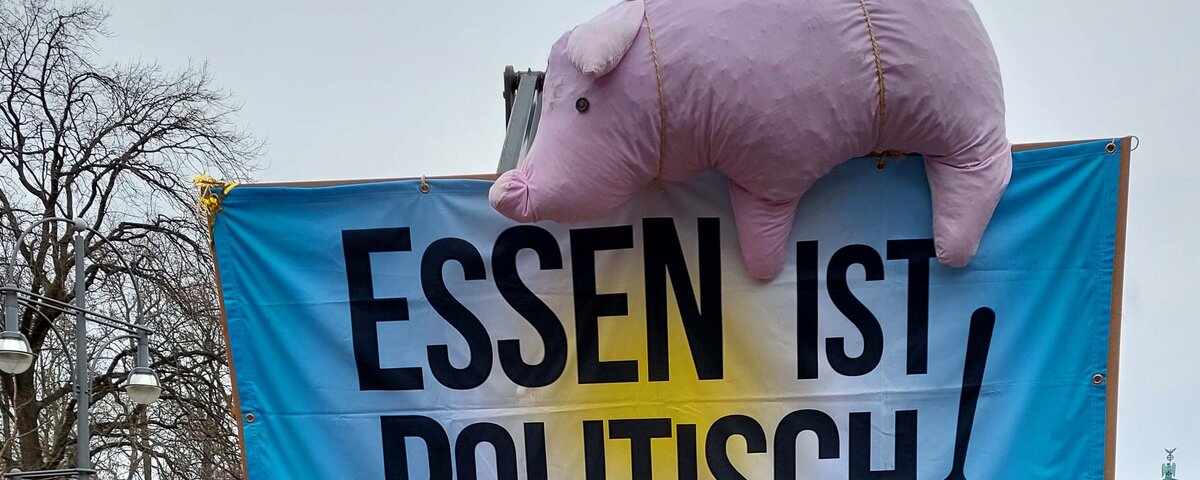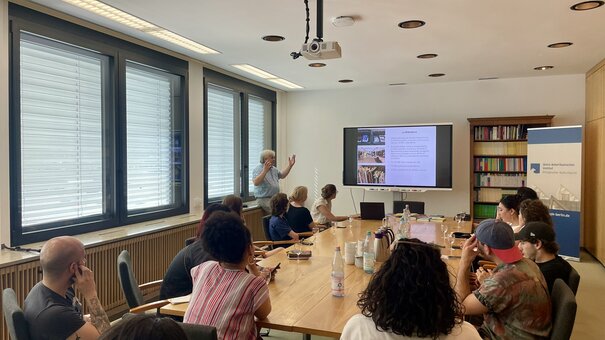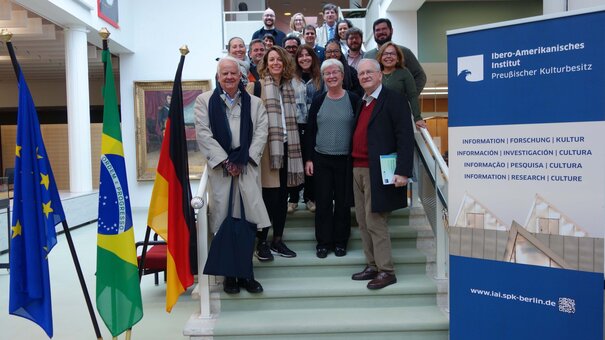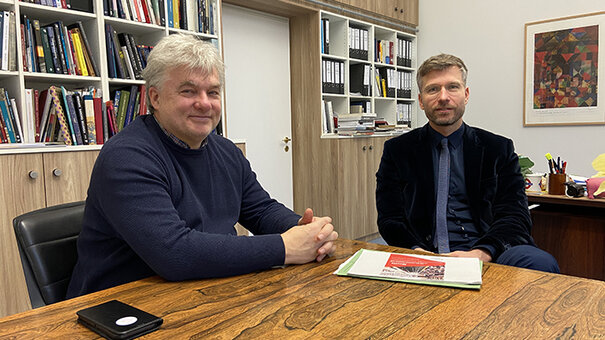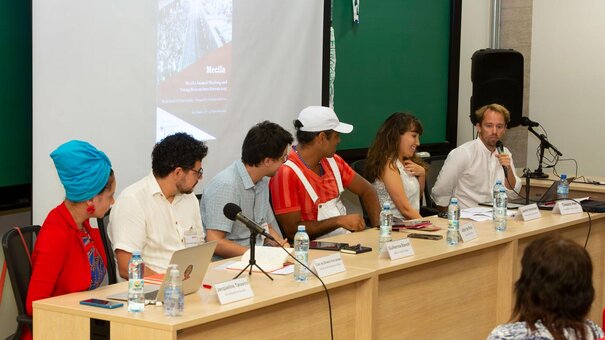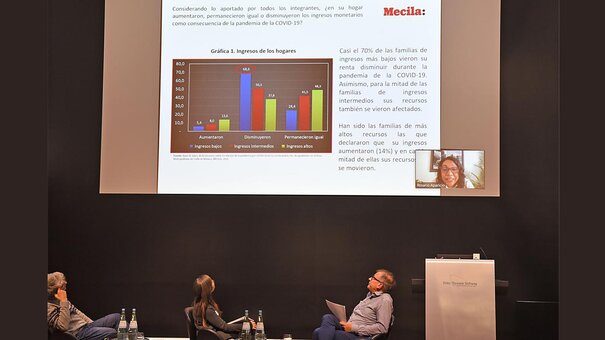Food for Justice: How (in)just is our food system?
Renata Motta’s (HCIAS, Universität Heidelberg) and Facundo Martín’s (CONICET, Universidad Nacional de Cuyo, Argentina) research focusses on our food system, its socio-ecological impact and transformation processes. On July 10th they discussed at the Ibero-Amerikanisches Institut the findings of a BMBF (now BMFTR) financed program, inequalities related to agricultural food production and its outcomes and the respective claims of social movements in Latin America and Europe.
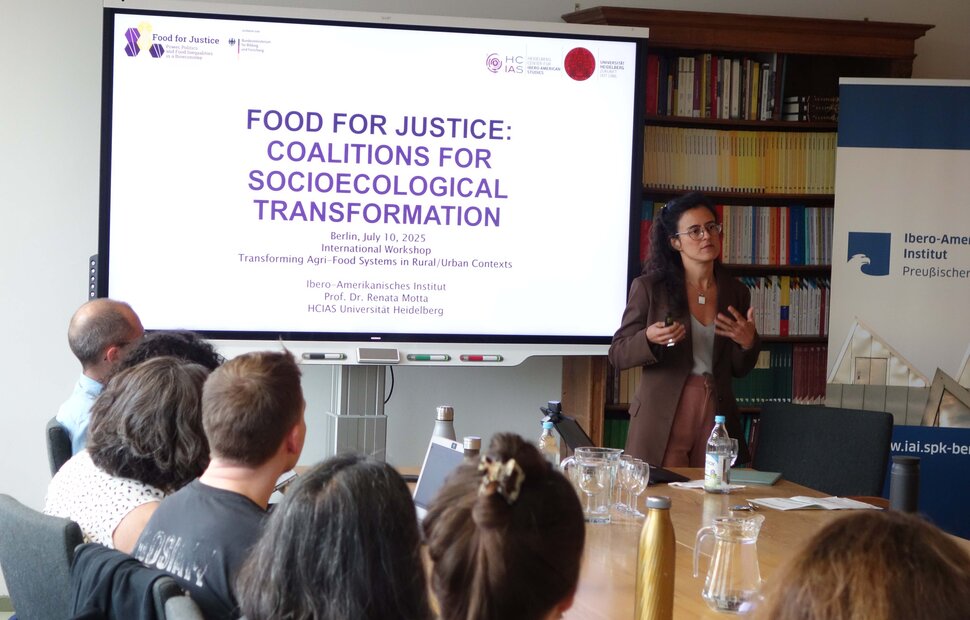
Event at IAI
Renata Motta (HCIAS, Universität Heidelberg (external link, opens in a new window)) presented the results of her project Food for Justice: Power, Politics and Food Inequalities in a Bioeconomy (external link, opens in a new window) (BMBF/BMFTR (external link, opens in a new window), 2019-2025) at a public event at the IAI on July 10, 2025, in conversation with Facundo Martín (external link, opens in a new window), who is currently a guest researcher at the IAI.
An academic exchange on the topic took place in a workshop at the IAI on July 10 and 11, 2025.
Cooperation partners were the Universität Kassel, (external link, opens in a new window) the Freie Universität Berlin (external link, opens in a new window) and the Alexander von Humboldt-Stiftung (external link, opens in a new window).
Food for Justice: Coalitions for Socioecological Transformation, event at the IAI, July 10, 2025
Renata Motta
Renata Motta (external link, opens in a new window) is Professor of Society, Culture, and Communication in Latin America at Universität Heidelberg (external link, opens in a new window), where she is also Deputy Director of the Heidelberg Centrum für Ibero-Amerika-Studien (HCIAS) (external link, opens in a new window). Her work focuses on the political sociology of Latin America, with an emphasis on movement studies, the sociology of social inequalities, and aspects of gender studies.
Food for Justice: Power, Politics and Food Inequalities in a Bioeconomy (external link, opens in a new window) (2019-2025): was funded by the Bundesministerium für Bildung und Forschung (BMBF), now Bundesministerium für Forschung, Technologie und Raumfahrt (BMFTR) (external link, opens in a new window).
Renata, you directed the research project Food for Justice: Power, Politics and Food Inequalities in a Bioeconomy. The name of your project alludes to the food justice movement.
Could you tell us something about this movement?
Renata Motta: The food justice movement originated in the USA, drawing on the legacies of the civil rights movement’s struggles against racial segregation in public spaces and services, and from environmental justice movements denouncing chemical contamination in low-income and non-white communities.
Food justice movements localize alternative food initiatives (eg farmers’ markets, community gardens) within these communities. They aim to improve access to healthy, fresh, diversified food; support local farmers, create stable and meaningful jobs,; increase green space and leisure possibilities.
What was your research project about? Who collaborated?
Renata Motta: The research was about social movements as drivers of change for a socioecological transformation in food and agriculture, with case studies in Brazil, Chile and Germany. It tracks national, regional and local coalitions as they engage with the state to shape public policies or protest on the streets; and food movements such as community supported agriculture, food councils, peasant movements. Food for Justice furthered conceptual development in food inequalities so as to analyze social and political projects addressing inequalities based on class, gender, race, ethnicity, rurality, citizenship and categorical divisions between humans and more-than-humans.
The research team was composed of doctoral researchers and postdoctoral researchers: Marco Teixeira, Eryka Galindo, Lea Zentgraf, Birgit Peuker, Judith Müller, Mariana Calcagni, Federico Masson, Thalita Kalix, Madalena Meinecke and Carolin Küppers, as well as a number of master students as research assistants across these 6 years in the Freie Universität Berlin and Heidelberg Universität.
What did you find out? What are parallels or differences between the Marcha de Margaridas in Brazil and the Wir haben es satt! movement in Germany?
Renata Motta: These are national coalitions targeting injustices in the agri-food system as they pressure the state to promote food and agrarian change.The research built on multimethods including quantitative and qualitative data.
Their context and organizational background are very different: in Brazil, rural working women focus their demands on gender equality in work and politics, a strong welfare state, land reform, and life free from all forms of violence; in Germany, environmentalists, small farmers, consumers, human rights organizations converge around the need to promote ecological farming, small-scale agriculture livelihoods, animal rights and global justice. Both believe in democracy and in the need to stay in the trouble, that is, crafting alliances despite differences.

Facundo Martín
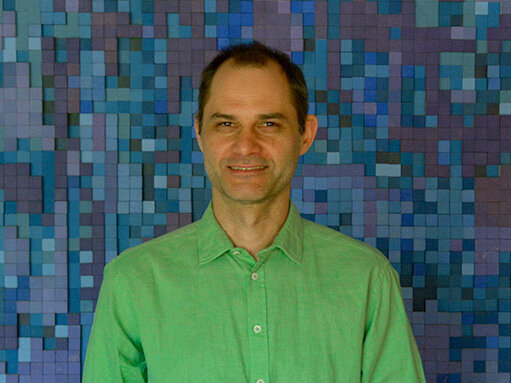
Facundo Martín (external link, opens in a new window) is a CONICET researcher and teaches at the Universidad Nacional de Cuyo (external link, opens in a new window)(Argentinien). He is currently a guest researcher at the IAI with a Georg Forster-Research Fellowship (external link, opens in a new window) from the Alexander von Humboldt-Stiftung (AvH). His areas of expertise are human geography, agricultural economics, agricultural policy, and agricultural sociology.
CONICET: El Consejo Nacional de Investigaciones Científicas y Técnicas is the central national research organization in Argentina.
Facundo, you are currently fellow of the Alexander von Humboldt-Stiftung and guest scholar at the IAI with your research project The Construction of Agroecological Food Systems in City-regions. Territorial and Socio-political Challenges.
What is your research project about?
Facundo Martín: The project’s originality lies in the understanding of how transformations of agri-food systems towards sustainability engender their processes of stagnation and conventionalization through a multi-situated, transdisciplinary and North-South comparative approach. I investigate these questions in two city-regions where the transformation towards a sustainable agri-food system has become an important social and political challenge: the Mendoza Metropolitan Area in Argentina and the Berlin-Brandenburg Metropolitan Region in Germany. Such an empirical and comparative research carried out in the “Global North” by a scholar from the “Global South” entails valuable epistemological and geopolitical challenges in terms of research innovation.
Why did you choose the IAI to host your research?
Facundo Martín: I conducted my research with Kristina Dietz (external link, opens in a new window) at the Universität Kassel (external link, opens in a new window) and Barbara Göbel at the IAI. As an Anthropologist interested in environmental inequalities, natural resource conflicts and knowledge circulation, Prof. Dr. Göbel holds a strong knowledge of both German and Argentine challenges around socio-environmental transitions. In addition to its formidable Library, the IAI, as an interdisciplinary centre for academic and cultural exchange between Germany and Latin America, the Caribbean, Spain and Portugal, is an unbeatable place to conduct comparative and transnational research.
Can you give us a preliminary glimpse in your results?
Facundo Martín: The Berlin-Brandenburg food systems represent a complex network of heterogeneous structures, processes, and relations characterised by overlapping and competing sub-regimes that coexist problematically. This fragmented landscape is further complicated by historical land structures and current dynamics that actively work against the consolidation of a more just and equitable food system. A significant challenge arises from the substantial gap between local fruit and vegetable consumption demands and actual regional production capacity, resulting in a food system dominated by what can be characterised as "Organic Food from Nowhere" – products that meet organic standards but lack a meaningful connection to local production networks. Perhaps most critically, the voices and initiatives of migrant workers and other "subaltern" classes and groups remain largely opaque and marginalised within the broader "food question" landscape in Brandenburg, highlighting systemic exclusions that perpetuate inequities in both food access and food system governance.
Was können Europa und Lateinamerika voneinander lernen?
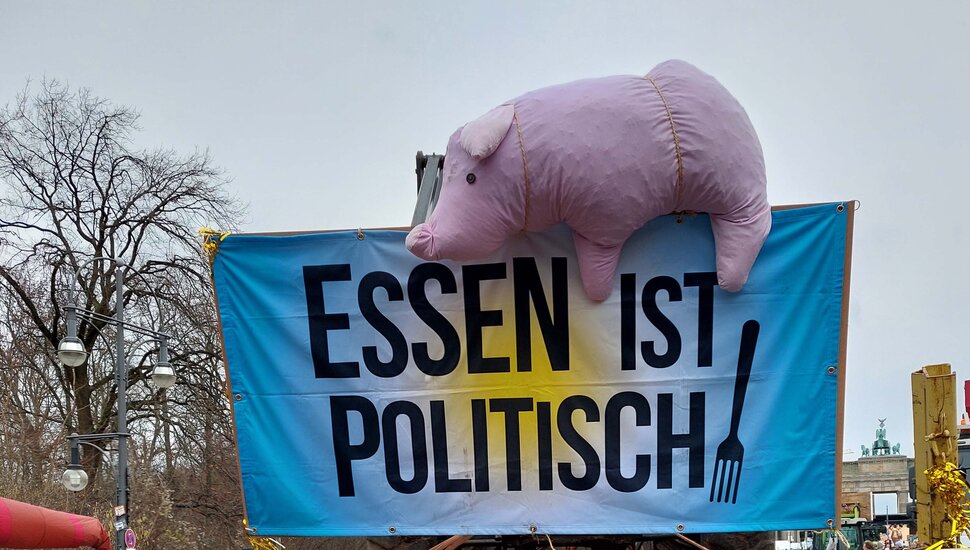
Renata und Facundo, your research on claims or models for socioecological transformation is also closely related to different aspects of inequalities.
Meanwhile, the IAI partners in Mecila – Maria Sibylla Merian International Centre for Advanced Studies in the Humanities and Social Sciences Conviviality-Inequality in Latin America (external link, opens in a new window) (BMFTR (external link, opens in a new window), 2020-2026), an international research project with its main hub in São Paulo. Mecila emploays conviviality as an analytical concept to describe ways of living together in specific contexts which also adresses consequences of inequalities .
All projects combine point of views from Latin America and Europe.
What can Europe and Latin America learn from each other?
Facundo Martín: Europe can draw significant insights from Latin America's grassroots agroecological movements and their success in integrating bottom-up approaches into public policy frameworks through popular education traditions rooted in peasant movements.
Latin America's innovative merger of agroecology with solidarity economy principles offers Europe models for food system transformation addressing social and ecological objectives. The region's social movement-driven approach demonstrates how to build coalitions that successfully promote agroecological integration into governance structures, providing valuable lessons for European efforts to scale sustainable food practices.
Conversely, Latin America can benefit from Europe's sophisticated policy frameworks that integrate environmental sustainability, health, and equity across multiple sectors and scales. Europe’s experience with multi-stakeholder governance models, cross-border coordination mechanisms, and urban food system innovations provides valuable lessons for Latin America's rapidly urbanising populations and regional integration challenges.
This bidirectional exchange of knowledge—combining Latin America's social movement-driven agroecology with Europe's policy sophistication and private-public partnerships— creates a powerful foundation for addressing shared global challenges of food security, climate change, and equitable food system transformation.
Renata Motta: Food for Justice has searched for contextualized examples of social mobilization over food and agriculture and the differences show important insights about what one country can learn from the other.
The Brazilian movements have a strong agenda on hunger and food security. In Germany, it was only very recently that food movements started to see food insecurity in the country, as it was dealt before as a matter from the Global South. Gender justice and feminism are strong themes and actors in Brazilian food movements; while in Germany gender inequalities in the agrifood system are also significant but not object of mobilization as much.
By contrast, animal rights are one of the most important themes in German food movements, and hardly appear as a topic in Brazil, apart from vegan movements. In both countries, there is an incipient anti-racist agenda in food movements and this could be a topic of common interest, given the coloniality of the global agrifood system.
Global challenges like a socioecological transformation in agrifood systems need contextualized discussions and conversations and mutual learning.
Is it possible to support change also as a single consumer?
Facundo Martín: I feel that this is always a tricky question. I would answer: only partially. Although individual and everyday decisions on food consumption are important and even the subject of research, the transformation of agri-food systems requires structural collective policies and collective actions.
Renata Motta: I agree with Facundo. Food is a topic that lends itself to various forms of politicization and strategies of change. The transformation of everyday food practices like production, acquisition based on political and moral criteria (fair trade, ecological, etc), cooking and eating, can indeed generate important aggregate effects and signal cultural dynamics of change that inform markets and states. However, even when consumers change their food behaviour, it is usually a result of collective action, namely, a cultural change following years of social movements engaged with specific social problems, signaling solutions, raising awareness, mobilizing attention.
Thank you very much for this interview to both of you!
More information
- Renata Motta (HCIAS; Universtität Heidelberg) (external link, opens in a new window)
- Facundo Martín (CONICET/Universidad Nacional de Cuyo, Argentina, AvH-Fellow) (external link, opens in a new window)
- Food for Justice: Power, Politics and Food Inequalities in a Bioeconomy (BMBF | BMFTR, 2019-2025) (external link, opens in a new window)
- Heidelberg Centrum für Ibero-Amerika-Studien (HCIAS), Universität Heidelberg (external link, opens in a new window)
- Freie Universität Berlin (external link, opens in a new window)
- Universität Kassel (external link, opens in a new window)
- Alexander von Humboldt-Stiftung (external link, opens in a new window)
- Bundesministerium für Forschung, Technologie und Raumfahrt (external link, opens in a new window)
- CONICET Consejo Nacional de Investigaciones Científicas y Técnicas, Argentinien (external link, opens in a new window)
- Mecila – Maria Sibylla Merian International Centre for Advanced Studies in the Humanities and Social Sciences Conviviality-Inequality in Latin America (BMFTR 2020-2026) (external link, opens in a new window)
- Mecila-Teilprojekt des IAI: Medialities of Conviviality and Information Infrastructure (BMFTR 2020-2026) (external link, opens in a new window)
- Guest researchers at IAI (external link, opens in a new window)
- AvH-Scholars ar IAI (Article SPKMagazin, 13.08.2024, in German) (external link, opens in a new window)
